‘The Greatest Hits’ Changed How These Stars Listen to Music

- Oops!Something went wrong.Please try again later.
There are few distinctly human biological experiences more frustrating than wanting to cry but being unable to make the tears flow. We can feel the sadness in the core of our being, and our minds are trapped in the dense, impenetrable fog of our feelings, tumbling around our brains like a sneaker in the dryer. And yet, the tears just will not fall. If you’re like me, you remedy this nagging sensation by putting on your noise-canceling headphones, drawing the curtains, and pressing play on “Fingertips” by Lana Del Rey. The crying begins, the catharsis takes hold, and it becomes almost too easy to sit and stew in that all-consuming grief. Sitting in this sadness can be such a relief that we start to crave it.
Lucy Boynton, star of The Greatest Hits—a new romantic drama streaming on Hulu now—understands this all too well. “I’ve become much more mindful of not wallowing [in the way music makes me feel],” Boynton told The Daily Beast’s Obsessed recently. The effect of music on her mood is something that she says she’s noticed much more often after wrapping this film, which is all about the power that music has to sway our emotions—whether in a positive or negative direction, or some volatile space in the middle.

Lucy Boynton and Justin H. Min.
In the film, a young woman named Harriet (Boynton) is stuck in her grief over her boyfriend Max (David Corenswet), whom she lost two years prior in a tragic car accident. In her anguish, Harriet discovers that she can briefly time-travel back to moments that she and Max shared whenever she hears a song that was playing when they were together. This could easily be a corny gimmick for the film to hook itself onto, but instead, The Greatest Hits conjures plenty of emotional resonance by exploring how deeply humans tie music to their experiences, and how it impacts our ability to feel and to grieve.
‘The Greatest Hits’ Tells the Most Original Time Travel Story in Years
This sonic time-traveling is Harriet’s gift, as well as her curse. It allows her to see the love of her life one more time, at least for the length of a song. But ultimately, these strange occurrences keep her from moving on, derailing her life and career entirely. “It’s so much easier than we give credit to. We get pulled back [in time], stay tethered to those memories, and hold onto those things as superior to present tense,” Boynton told me over the phone. “I think it’s a human trait to do that.”
While the film is an accessible, crowd-pleasing romance, it’s also a stirring meditation on the non-linear process of grieving, and how complicated it can be to allow ourselves to move forward. Both Boynton and her costar Justin H. Min, who plays Harriet’s love interest David—whom she meets in a loss support group, where he shows up to try to process his grief surrounding his parents’ death—found themselves deeply affected by writer-director Ned Benson’s slyly moving script. In interviews with The Daily Beast’s Obsessed, Boynton and Min told us all about their relationship to grieving, how they use music to process their emotions, why it’s so easy to stay planted in the joy of the past, and the beauty that comes with moving forward.

Lucy Boynton and Justin H. Min in The Greatest Hits.
This movie is one of the most original time-travel stories in years, primarily because the film is initially reluctant to call what Harriet is experiencing time travel. I have to imagine that’s something that attracted you to the script.
Boynton: When I first read the script, I saw time travel and I assumed it would be a kind of sci-fi movie, and then I found exactly what you said to be true. I use music in the same way Harriet does. I think we all do. The film is about how easy it is to get locked into a sense of nostalgia or sentimentality, and that’s a human trait to do that—not necessarily just for rose-tinted parts of your life, but just as you grow older, and re-analyze, and understand parts of your life more, and cherish people and moments. It’s so much easier than we give credit to, to get pulled back and stay tethered to that. What this film teaches you is that you’re not dishonoring something by moving forward. And that was such a vital lesson to learn from the script. I found it such a unique way to explore that message and such a hopeful way of looking at it.
Min: [Getting] the script was very timely, because I was grieving the loss of someone I knew very well. As I was experiencing that, I was handed this movie that explores grief, music, and moving on. It felt very pertinent to me, I think that’s one of the beautiful things about what I get to do: I explore these kinds of things through my work. Things I might be going through in my own life, I can experience a sense of catharsis and healing as I work through the material.
‘Challengers’ Is a Grand Slam of Sex and Sweat
When Harriet returns to these moments in the past during her life with Max, she’s not immediately concerned with trying to save him—she typically begins an interaction just by enjoying her time with him. Lucy, what is it like to convey that emotional balance of seeing someone you love but knowing that it won’t last?
Boynton: It’s a tricky line to walk, and it’s heartbreaking. We all have that fantasy—especially when we’ve lost someone—about getting more time, this stolen time with someone we loved. It started as such a gift for Harriet. It healed the heartbreak, in a way, because it meant she didn’t have to face it. She could play a record and go back and have those cherished moments with Max again, and sit in this past tense. [But] it’s something that becomes her greatest obstacle. It prevents her from staying connected to the people around her.
You realize you’re not growing in that. What was previously a medicine for the pain starts to make the injury much worse. It’s a devastating thing to recognize. There is no such thing as repeating past times; whether you like it or not, you are still tumbling forward. The resistance makes it more painful.
Justin, just like Lucy, your character also has to straddle this loss while attempting to welcome something back into his life. David is similarly trying to cope with both the loss of his parents and their business that he inherited, where he’s keeping their memory alive.
Min: It was a real balancing act. As an actor, I try to balance that, but also in the head of the character, David’s trying to figure that out as well. He wants to move on, he wants to move forward, but he’s still weighed down by the grief over his parents. It physically manifests itself by keeping the antique shop. Harriet is someone who takes him into the present, and brings him out of his head. That’s often what grief does to us. It keeps us in our head, in our thoughts, in sadness. Sometimes you meet people in your life, or have circumstances in your life, that pull you out of your head and into your body. It’s the beauty of these experiences that Harriet and David have together [that does this]. The silent disco they go to, the Bears in Space party—these are things that bring them into the present tense.
‘Stress Positions’ Is the First Genuinely Funny COVID Period Piece
The film’s premise is that something like a song—and the memory we attach to it—can be enough to take us right back to that place in time. Are either of you prone to letting your music dictate the mood? For me, if I hear the wrong song on shuffle, the day is a wash.
Min: [Laughs.] Absolutely. It’s interesting, because I feel like I use music in both scenarios. In one case, I use it to bring me out of a particular mood. For instance, if I’m feeling sad, some songs cheer me up and bring me back to moments in time when I was so happy, free, and joyful. And then there are other times you just want to sit in whatever feeling you’re processing. So you use an amplification of that through music.
I think it’s good to be a little bit masochistic in that way. It’s a necessary part of life.
Boynton: I didn’t notice until doing this movie that I use music in the very same way that Harriet does. All my playlists are so tethered to a time in my life, or the person who first played it to me. Or, the context of the song is just as vital—and just as at the [forefront of my mind]—as the song itself. I’ve become much more mindful of not wallowing, of not trying to stay there.

Lucy Boynton and Justin H. Min
Are there any songs in particular that are go-tos to do this for you?
Boynton: Oh my god, so many.
Me too.
Min: I mean, I have playlists that are just like, “Feels.”
Boynton: From my childhood, a mixture of the Spice Girls and the Beatles, a real healthy combo of those. And then, the song that I—I have this one song on repeat all the time—it’s called “Saying Goodbye” by Ondara. That song just reminds me of being in London, in summer, in such a specific place and time. So again, trying not to overplay that one and relive that too much, but it’s definitely my current guilty pleasure.
That’s always a tricky line to walk: not overplaying, knowing that you could very easily cross that line.
Boynton: I’m guilty of just having songs on a loop. Play it till the end of time.
‘Mary & George’: Julianne Moore Loans Her Son Out for Sex in Lusty New Series
The Greatest Hits is so steeped in Los Angeles music and festival culture. And as we wade through the muck of our carefree early 20s, so many people find that their dreams get sidelined by the events of life, which is exactly what happens to Harriet after she loses Max, and to David after he loses his parents. Did either of you experience this? My life is not how I anticipated it would look even five years ago.
Min: Oh my gosh, absolutely. I feel like I have an existential crisis every six months. It’s just a consequence of getting older. I think when you hit these specific junctures in your life—when you feel like your identity is changing, your values are changing—you’re forced to reckon with what exactly you want to do, who you want to be, and how you want to live. That ever-evolving process is the beauty of life, and the journey that we all go on. When we’re younger, we think we’re waiting to arrive somewhere, at a destination. The older you get, you realize you’re never arriving. It’s always an ongoing journey, always an ongoing process.
I love how poetic that is. And I’m also glad to know I’m not the only one who has an existential crisis every six months.
Boynton: Honestly? It’s the greatest freedom reaching an age that I had put so much weight of anticipation and expectation on. [Boynton turned 30 in January.] When I was in my late teens, I had a checklist of where I wanted to be at 25 and then 30, and then the closer you get to that age, you realize how old you thought 30 was when you were 17—rude! But you totally didn’t give yourself grace for life to happen.
That has been the greatest privilege. All of the people I’ve met unexpectedly, all of the things that have happened that have been a surprise, have been the greatest gifts, whether that is teaching yourself to do something difficult, or just some piece of kismet landing in your lap. I think that’s what is so unaccounted for in terms of planning. The older I get, the happier and calmer I am, because I’ve let go of that strict idea of expectations in myself… The advice I got from my mom all my life is, “The older you get, the better it gets,” and you don’t believe that in your late teens because you’re told that youth is the greatest currency. It lasts a lot longer than anyone gives you warning for.
I feel younger now than I did when I was 17 or 18.
Boynton: ABSOLUTELY. And god, you don’t hold yourself to such strict expectations! Everything just gets better and freer.
Get the Daily Beast's biggest scoops and scandals delivered right to your inbox. Sign up now.
Stay informed and gain unlimited access to the Daily Beast's unmatched reporting. Subscribe now.

